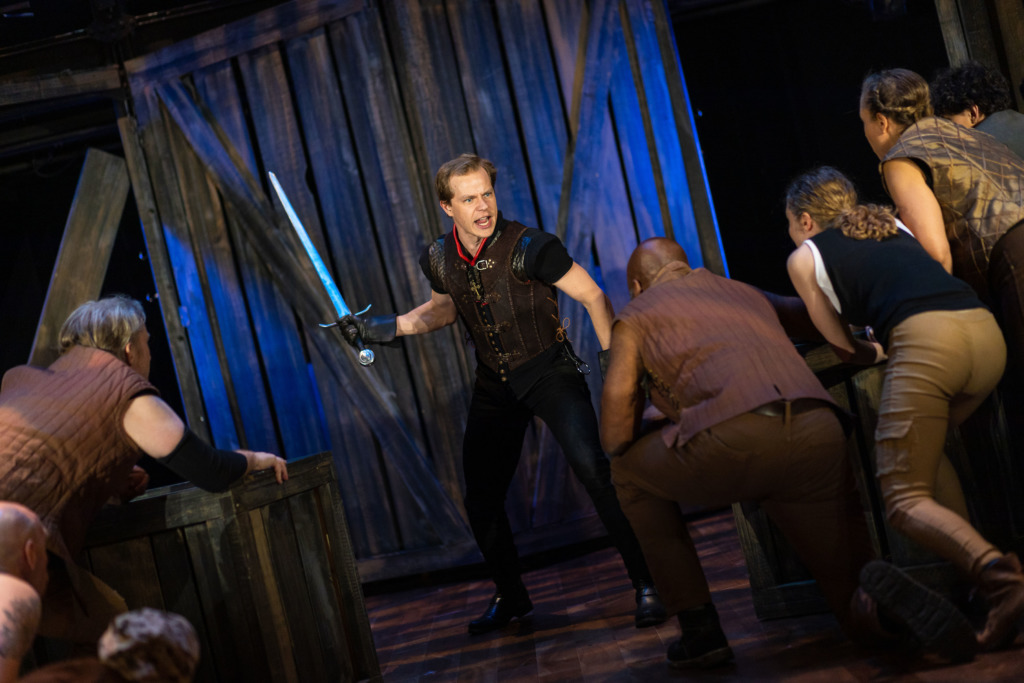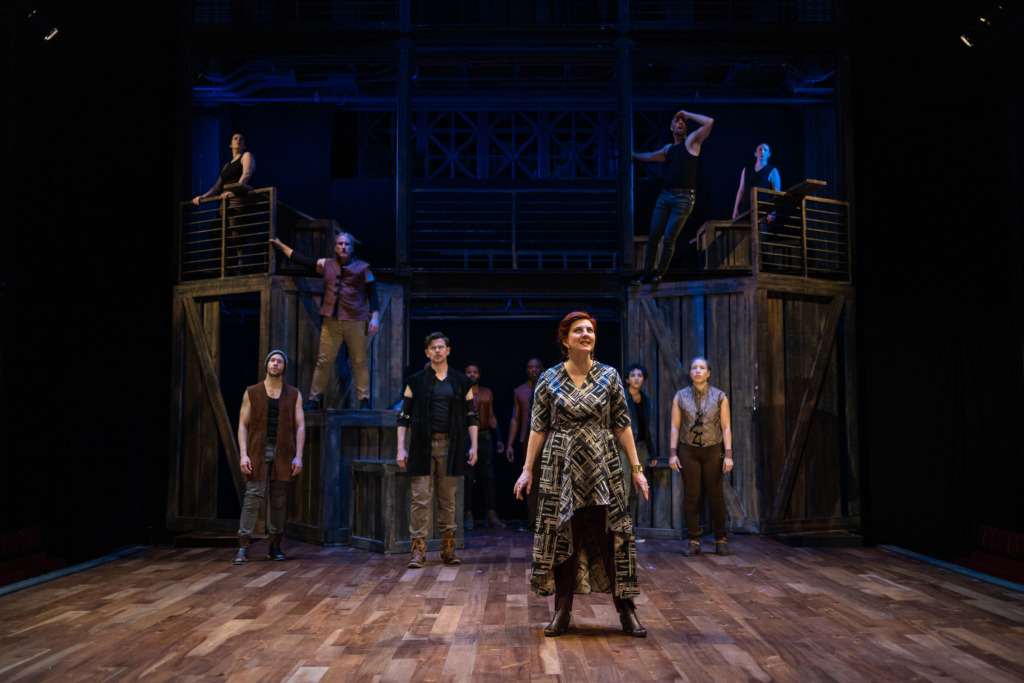“Oh for a muse of fire that would reach the uppermost heights of creativity— the stage a kingdom…” we’ve all heard it. We all recognize it. Do we all know that it comes from one of Shakespeare’s histories? You may have heard it, recognize it, and even know that it comes from Henry V, but you’ve never heard it until you hear it slipping delicately over the lips of Lesley Malin, Chesapeake Shakespeare Company’s Executive Producing Director— or for the purposes of this performance— The Chorus. Now appearing— for the first time in their Globe-replica, downtown-permanent residence, Chesapeake Shakespeare Company presents Henry V, directed by Alec Wild. With original compositions by Caleb Stine, the slightly less than three hours’ stage traffic brings to bare one of the more darkened histories of the Bard’s canon and this simplistic, stunning approach has audiences enthralled.

Shakespearean histories— not the dramas or the comedies, or God forbid— the problem plays— are not known for their brevity (and let’s face it, short of some of the comedies, despite the infamous quote “brevity is the soul of wit”, neither is much of William Shakespeare’s canon.) However the company assembled to perform Henry V under the direction of Alec Wild with text & vocal coaching by Lisa Beley, has the audience completely engaged from start to finish, holding their attention spans in utter rapture as the events unfold. There’s a minimalist approach to this particular production that well-serves every element of Henry V; there aren’t any frills or spectacle to overwhelm or distract those grappling with the story and the performers are so impressive with their emotional intention and delivery that you don’t feel bereft for a lack of all that excess in the aesthetics department.
Scenic Designer & Technical Director Dan O’Brien works the three levels of the stage into the play space. Director Alec Wild chooses a very selective limit on which scenes occur on the second and third tiers of the staging, which add emphasis to those moments without overbearing on the production as a whole. Lighting Designer Minjoo Kim uses a lot of cooler tones to represent shifts in time and location, particularly the darkness of night and pre-dawn before the battles. Everything is subtle; a delicate and understated design layout to allow the audience to feel the drama coursing between character dialogue exchange. So too is the work of Costume Coordinator Kristina Lambdin, who excels at the task of transforming just over a dozen actors into three dozen different characters. A simple flip of a cloak or addition of a vest or head piece (with the French always in blue) signals the change from one character to another, allowing for the streamlined pacing that Director Ale Wild has set forth to truly succeed.
Vocal and text coach Lisa Beley weaves a tapestry of aural magic through the cast, particularly in the scenes with Princess Katherine (Morgan Pavey) and Alice (Teresa Spencer.) While this scene is arguably the most superfluous scene in the entire production, it is also the most hilarious and serves the vital purpose of bringing some much-needed levity to an otherwise treacherous and historical slog of non-action-until-there-is-action. The French accents, and flawless, fluid delivery of the French language (and again with the poorly fractured English) from Pavey and Spencer in this highly humorous scene is a thing of rare and true beauty that it’s almost overlooked because of the laughable shenanigans happening in the moment. Beley’s capability to impart to the cast the clear and concise delivery of Shakespeare’s text is perfect for those unfamiliar with the archaic and highly specialized language. This production is excellent for both those well-versed in Shakespearean dialect and those who have never heard it before, and of course everyone in-between.

Lesley Malin, the aforementioned Chorus, is like a haunted angle or strikingly lovely gargoyle who oft sits perched just out of immediate sight on the second tier of the staging, watching the show unfold. Introducing scenes at the top of the show and the second act, as well as when the timeline in the story jolts forward, Malin’s command of language is impressive and it is easy to view her portrayal as a narrative force that guides the story along— not unlike a kinder, wiser Prospero, and the play itself is both her ship and tempest. Everyone in the cast (with the exception of Malin and Samuel Adams, playing the titular role) doubles, triples, and quadruples up on roles, carrying the work of three times as many as there are people in the production and they do so flawlessly. Ian Charles, Jonas Connors-Grey, Michael Crowley, Terrance Fleming, Oz Heiligman, DeJeanette Horne, Bess Kaye, Morgan Pavey, Dawn Thomas Reidy, Sam Richie, Teresa Spencer, and Rya Tumulty move as one unit at times, sharing the weight of the story that is both history and Henry V.
As the titular character, we see Samuel Adams in many lights throughout the performance. Tis but brief, his moment of gaiety and joviality, at the very beginning before the weight and gravity of crown is thrust upon his head. Adams does an extraordinary job of balancing the dichotomy between solider who wishes to win and human being who wishes to empathize and share compassion among his fellow man, even if they be French. We even get a ridiculous series of goofy love-like emotions (in what could be considered the second-most superfluous scene in the production, where dewy-eyed Hal is going after the hand of Katherine and using Alice as the interpreter) that are delivered with lighthearted humor from Adams, which serve in sharp juxtaposition to some of the heavier scenes through which he navigates the character. It’s the rousing, confident St. Crispen speech— “oh we happy few”— that Adams delivers, which would readily have the audience willing to follow him once more into the breech, knowing full well defeat could certainly be the only outcome.
As the Welsh Officer, Captain Fluellen (Michael Crowley) the audience is treated to another bit of humor, though far more rigidly packed and seriously presented. Crowley, who does a commendable and praiseworthy job of hinting at the Welsh accent in a way that still makes his words understandable (Welsh can be very difficult to understand even to the trained ear), has an air of reverent respect about his character. When he goes at Pistol (Sam Richie), however, in the scene with the leek, you can’t help but giggle and enjoy yourself thoroughly. As the aptly named— firing-off-at-the-mouth–Pistol (with much bang and bravado though very little aim and follow-through) Sam Richie is a stalwart personality all his own. Often found in the company of his fellow stooges, Nym (Ian Charles) and Bardolph (Jonas Connors-Grey), the trio carry on a series of hilarious challenges and rowdy, boisterous shenanigans that again add some interesting points in the long slog on the way to “the big battle finale.” Ian Charles does a particularly fine job of delivering an ear-splitting scream (half-laced with terror) every time he’s ‘forced’ to draw his sword in that scene.

Teresa Spencer finds her moment in the spotlight as Nell Quickly— a convoluted character whose purpose in this production is at present to be the wife of Pistol. Spencer has much emotional gravitas to offer the role, particularly when delving into her sorrows over the death of Falstaff. (Spoilers— it’s a history. People die. Falstaff isn’t even really in this play. He gets his own play. Merry Wives.) She is reverent and full of compassion when detailing her final encounters with the character. Spencer doubles up as the many-times previously mentioned Alice, engaging in the witty banters and humors with Katherine (Morgan Pavey, who does an exceptional job in all her scenes as Katherine and has the most expressive and animated facial expressions) and Henry V alike.
Terrance Fleming, as the Dauphin and others, finds his moment as the Dauphin when waxing wildly poet, bordering on the verges of inappropriately erotic, over his horse right before the end of Act I. Fleming is engaging and thorough and one can only assume, given that it’s Shakespeare, that the horse represents something else entirely. This scene is tied delectably together by The Duke of Orléans (Bess Kaye) and Lord Rambures (DeJeanette Horne) who clap back and send zinger after zinger at Fleming’s Dauphin as this horse-stuff unravels.
The show is chock full of excellent performances. Despite its length it moves along at a sailing clip, keeping the audience engaged even though there’s a great deal of nothing actually happening until the end. (The history is structured in such a way that it’s a lot of plotting and planning and back and forth messaging, all of which leads up to the battle.) Chesapeake Shakespeare Company does an extraordinary job of making this history engaging and exciting, captivating and complete.
Running Time: Approximately 2 hours and 50 minutes with one intermission
Henry V plays through May 15, 2022 with Chesapeake Shakespeare Company— 7 S. Calvert Street in Baltimore, MD. Tickets are available by calling the box office at 410-244-8570 or purchasing them in advance online.
